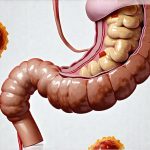The human experience is deeply intertwined with emotion, and often, it’s not the event itself but our anticipation of it that truly shapes our response. This is particularly evident when considering fear – a primal instinct designed for survival. However, in modern life, we frequently find ourselves fearing future possibilities, dwelling on “what ifs” that rarely materialize. This persistent anticipation of negative events doesn’t just affect our mental state; it can manifest physically, triggering a cascade of physiological reactions. The gut, often referred to as the “second brain,” is especially sensitive to these emotional shifts, becoming a focal point for psychosomatic symptoms when fear takes hold.
This intricate connection between mind and body highlights the power of anticipatory anxiety. It’s not merely about reacting to stress; it’s about reacting to our predictions of stress. Our brains, constantly scanning for threats, can essentially create physical discomfort even before a stressful situation occurs. This phenomenon is particularly pronounced in relation to the stomach, where a complex interplay of nerves, hormones, and gut microbiota makes it exceptionally vulnerable to emotional influence. Understanding this link between fear anticipation and gastrointestinal responses is crucial not just for managing anxiety but also for recognizing and addressing potential psychosomatic illnesses that can arise from prolonged emotional distress. Considering the impact of diet on our mental state, understanding the link between food and mood is essential.
The Neurobiology of Fear and Gut Response
The brain’s amygdala plays a central role in processing emotions, particularly fear. When we anticipate something frightening, the amygdala initiates a cascade of neurological events. It signals to the hypothalamus, which activates the sympathetic nervous system – often described as our “fight or flight” response. This activation releases stress hormones like cortisol and adrenaline, preparing the body for action. Simultaneously, the vagus nerve, a critical communication pathway between the brain and gut, is heavily influenced. Increased activity in the amygdala leads to heightened vagal tone, impacting gastric motility, secretion of digestive enzymes, and even the permeability of the intestinal lining.
- This means fear anticipation can slow down or speed up digestion.
- It can increase stomach acid production, leading to heartburn or indigestion.
- And crucially, it can alter the gut microbiome – the community of bacteria in our intestines that plays a vital role in overall health.
A dysbiotic gut microbiome (an imbalance of bacterial communities) is increasingly linked to anxiety and depression, creating a vicious cycle where fear exacerbates gastrointestinal problems and vice versa. The hypothalamic-pituitary-adrenal (HPA) axis, another key player in the stress response, becomes chronically activated with persistent fear anticipation. This chronic activation disrupts hormonal balance and further compromises gut function, making individuals more susceptible to psychosomatic symptoms. Given the interplay between emotional state and physical health, it’s important to understand the link between hormones and stomach pain. The intricate network highlights why the stomach is often described as a “sensitive barometer” of emotional wellbeing.
Psychosomatic Manifestations: Beyond “Nervous Stomach”
The term “nervous stomach” often dismisses the very real physical discomfort experienced during times of anxiety. However, the connection between fear anticipation and gastrointestinal symptoms goes far beyond simple indigestion. Chronic anticipatory anxiety can manifest as a wide range of psychosomatic conditions affecting the digestive system. Irritable Bowel Syndrome (IBS), for example, is strongly linked to psychological factors, with many sufferers reporting a significant increase in symptoms during periods of stress or worry. Functional dyspepsia – chronic indigestion without any identifiable organic cause – is another common manifestation, often triggered by emotional distress.
Furthermore, the gut-brain axis plays a role in conditions like gastroparesis (delayed stomach emptying) and even inflammatory bowel disease (IBD). While IBD has known autoimmune components, stress and anxiety can significantly exacerbate symptoms and contribute to flare-ups. It’s important to note that these aren’t “imaginary” illnesses; they are genuine physical ailments with real suffering. The challenge lies in recognizing the underlying emotional component and addressing it alongside any necessary medical treatment. Ignoring the psychological factors only perpetuates a cycle of discomfort and distress, potentially leading to chronic health problems. Understanding the link between ulcers and stomach cancer is also vital for comprehensive understanding of digestive health.
Identifying Anticipatory Fear Triggers
Pinpointing the specific triggers for anticipatory fear is the first step toward managing its impact on your gut. This requires self-awareness and a willingness to examine thought patterns. – Journaling can be an incredibly effective tool. Record situations that induce anxiety, even if they seem minor. Note the physical sensations you experience in your stomach – bloating, nausea, cramping, etc. – Pay attention to negative self-talk. Are you prone to catastrophizing or assuming the worst?
– Identify recurring themes in your anxieties. Do you fear public speaking, social situations, financial insecurity, or health concerns?
Once triggers are identified, consider challenging negative thought patterns. Cognitive Behavioral Therapy (CBT) techniques can be incredibly helpful here. CBT helps reframe anxious thoughts and develop more realistic perspectives. For example, if you anticipate feeling ill before a presentation, challenge that fear by asking yourself: “What is the actual likelihood of getting sick?” or “Have I ever actually gotten sick during a presentation before?”. Practicing mindfulness and meditation can also help calm the nervous system and reduce anticipatory anxiety. This process often uncovers connections between mental state and physical symptoms, much like the link between leaky gut and emotional wellbeing.
The Role of Gut-Directed Hypnotherapy
Gut-directed hypnotherapy (GDH) is a promising therapeutic approach for managing functional gastrointestinal disorders, particularly those exacerbated by anxiety. It involves using hypnosis to target specific symptoms related to digestive function and emotional regulation. GDH aims to alter the way the brain perceives and responds to visceral sensations – the signals from the gut. By inducing a state of focused relaxation, hypnotherapy can help reduce sensitivity to abdominal discomfort, improve gut motility, and diminish anxiety associated with digestion.
Research suggests that GDH can be more effective than traditional therapies like medication for managing IBS symptoms long-term. It works by strengthening the brain’s control over the digestive system and promoting a sense of calm within the body. GDH isn’t about “curing” the gut; it’s about retraining the brain to better manage its relationship with the gut, reducing the impact of emotional distress on physical wellbeing. It is best delivered by a qualified hypnotherapist specializing in gastrointestinal disorders.
Lifestyle Adjustments for Gut-Brain Harmony
Beyond therapy and medical interventions, several lifestyle adjustments can support gut-brain harmony and mitigate the effects of anticipatory fear. – Diet: A balanced diet rich in fiber, prebiotics (foods that feed beneficial gut bacteria), and probiotics (live bacteria found in fermented foods) is crucial for a healthy microbiome. Avoid processed foods, excessive sugar, and artificial sweeteners, as these can disrupt gut flora.
– Exercise: Regular physical activity releases endorphins – natural mood boosters – and reduces stress levels. It also improves gut motility and overall digestive function.
– Sleep: Prioritize getting adequate sleep (7-9 hours per night). Sleep deprivation exacerbates anxiety and disrupts the gut microbiome.
– Stress Management Techniques: Incorporate relaxation techniques into your daily routine, such as yoga, deep breathing exercises, or spending time in nature. Cultivating social connections and engaging in enjoyable hobbies can also help buffer against stress and promote emotional wellbeing. Furthermore, understanding the link between gut microbiota and IBS can provide valuable insight into the gut-brain connection.
Ultimately, managing the link between fear anticipation and psychosomatic responses requires a holistic approach that addresses both the mind and the body. By recognizing triggers, challenging negative thought patterns, utilizing therapeutic interventions like GDH, and adopting healthy lifestyle habits, individuals can break the cycle of anxiety and restore balance to their gut-brain connection – leading to improved physical health and emotional wellbeing. Recognizing histamine intolerance as a potential factor is also key for some individuals. Finally, remember that the relationship between our minds and bodies is profound – even impacting cognitive decline in aging.


















